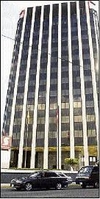Banks grow super-rich as company earnings falter - $20b net profit dwarfs stock market firms
Published: Friday | March 27, 2009

Scotiabank Centre, downtown Kingston, corporate headquarters of the Bank of Nova Scotia Jamaica, otherwise known as Jamaica's profit king. - File
Jamaica's commercial banking groups earned an estimated $20.5 billion last year, an amount equivalent to around 47 per cent of the after-tax profit of all domestic companies whose ordinary shares trade on the Jamaica Stock Exchange (JSE), a Financial Gleaner survey shows.
The figures are likely to re-engage the industry's critics, who have long complained about how Jamaica's banks price their products to customers, as well as draw a bead on the sector's two giants - Scotiabank Jamaica and National Commercial Bank (NCB) - which between them had net profit of approximately $18.3 billion, or over 89 per cent of the industry's net return.
When the other listed commercial bank, FirstCaribbean Jamaica is added to the mix, the banks' profit of those that have a place on the JSE's big board, moves to $19.16 billion or nearly 44 per cent of the $43.87 billion that the Financial Gleaner estimated that all listed companies made last year.
"The level of profits enjoyed by the banks speak to the level of charges/margins and spread that they make and companies are held to the detriment of these rates while on the other hand the banks are protected based on the collateral," grumbled Omar Azan, president of the Jamaica Manufacturers' Association.
"If you look at every little tran-saction, they charge for it and yes we are happy that Jamaican banks are making high profits but to the detriment of businesses, which are suffering because they can't afford to borrow money at the rates being charged."
Preference shares
The Financial Gleaner's analysis excluded the five firms with only preference shares listed on the exchange - two of which are subsidiaries of listed companies that were included.
Additionally, Guardian Holdings Limited and Sagicor Financial Corporation (SFC), which, while cross-listed on the JSE, are headquartered in Trinidad and Tobago and Barbados, respectively.
However, Sagicor Life Jamaica and Pan Caribbean Financial Services, two SFC subsidiaries listed in Jamaica, are part of the survey.
The 36 non-commercial banking firms reviewed by the Financial Gleaner - all of which closed their financial years sometime in 2008 - had accumulated net profit of $23.36 billion, $2.86 billion or 14 per cent higher than the estimated returns for the six commercial banks in operations last year, three of which are listed: Scotiabank, NCB and FirstCaribbean International Bank Jamaica.
But while manufacturing, trading and service companies, with a few exceptions, struggled to stay in the red in Jamaica's turbulent economic environment, financial firms generally, and commercial banks in particular, managed robust outturns, even as they began to adjust to the difficulties unleashed by the global financial crisis and related international recession.
The financial conglomerates, Scotiabank and NCB , especially, are likely to have had corporate leaders, in and outside their sector, cast envious eyes across their profit and loss statements.
In the case of Scotiabank Group Jamaica, its net profit of $9.62 billion was up 26.4 per cent, a return that would include the bulk of the $1.2 billion earned by its brokerage and investment banking subsidiary Scotia DBG Investment, in which it has 68 per cent control.
The $8.7 billion that Michael Lee Chin's NCB took to the bottom line was just shy of 32 per cent higher than the previous year's profit, notwithstanding a $581.27 billion loss suffered by its subsidiary, NCB Capital Markets, largely because of a $1.3 billion hit it took on investments from last year's debacle on Wall Street.
Collusion
The sector's critics have long protested the spread between what banks pay on deposits and their interest on loans, as well as their fees for other services.
Indeed, three years ago, when Doreen Frankson was president, the Jamaica Manufacturers Association filed a complaint with the Fair Trading Commission against the banks alleging collusion in rate setting. The FTC cleared the institutions, saying it found no evidence to sustain the charge. But doubts have lingered in some quarters.
But it is small businesses who felt most shut out of the credit market, due in part to their own tardy record keeping, but also because they represent a bigger risk to loan portfolios. Indeed, a bank like NCB has vastly enriched its bottom line by investing in securities funds it could otherwise have used for loans.
The bank's investment portfolio is about $80 billion according to the latest central bank data, near equal to its loan portfolio of $83 billion.
"It shows how much more Jamaica has shifted into a paper economy and making massive windfall," said Edward Chin-Mook, president of the Small Business Association of Jamaica.
"Further, it shows that the economy has compressed with the productive sector being starved for funds as a result of this paper economy with funds being redirected here; and has also contributed to the flight in value of the exchange rate."
business@gleanerjm.com.
















